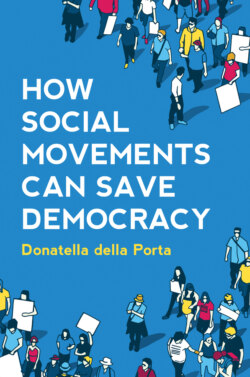Читать книгу How Social Movements Can Save Democracy - Donatella della Porta - Страница 6
Acknowledgements
ОглавлениеThis volume is based on the assumption that democratic conceptions and practices need constant innovation. In a moment in which various crises converge in challenging existing institutions, it is all the more important to reflect on what can be done in order to save democracy. Progressive social movements have historically been carriers of democratic deepening, elaborating and prefiguring alternative visions that have often then been constitutionalized in democratic institutions. In a period in which attacks on democracy come from the populist Right, research on attempts to improve democratic institutions through increased participatory and deliberative qualities is most important.
Looking at some of these attempts, with a critical view aimed also at singling out existing limits and conditions for improvement, is my purpose. In this sense, this volume can be seen as building upon and developing some of my previous contributions on related issues: first and foremost in Can Democracy Be Saved? (Polity 2013) and Social Movements in Times of Austerity: Bringing Capitalism Back into Protest Analysis (Polity 2015), but also in Movement Parties against Austerity (Polity 2017), Late Neoliberalism and its Discontents in the Economic Crisis: Comparing Social Movements in the European Periphery (Palgrave Macmillan 2016) and Social Movements and Referendums from Below: Direct Democracy in the Neoliberal Crisis (Policy 2017).
In addressing this task, I rely on a long-lasting research programme on institutional involvement by progressive social movements, carried out at the Center on Social Movement Studies (Cosmos) that I direct at the Scuola Normale Superiore in Florence. In particular, on crowd-sourced constitutionalism, referendums from below and movement parties, I have collaborated especially with my colleagues at Cosmos Lorenzo Cini, Andrea Felicetti, Francis O’Connor, Martin Portos, Anna Subirats, Hara Kouki, Lorenzo Mosca, Joseba Fernandez, Daniela Chironi and Jonas Draege, as well as with Colin Crouch, Michael Keating, Ken Roberts and Sidney Tarrow, who have been our most welcome visitors. I am also grateful for the support I received from the Hertie School of Governance and for the conversations I had during some visits to Berlin with colleagues there, among them Helmut Anheier, Christian Joerges and Claus Offe. At Hertie, I also wish to thank Stefanie Jost, who helped me in developing the project for this book. Some important stimuli also came from presentation of parts of my work at seminars and conferences, in particular at the Stein Rokkan Lecture at the Joint Sessions of the European Consortium for Political Research in Mons in 2019. Herbert Reiter has helped me greatly, improving the text through his critical but constructive reading (as well as through his patience and support while I was writing this book).
